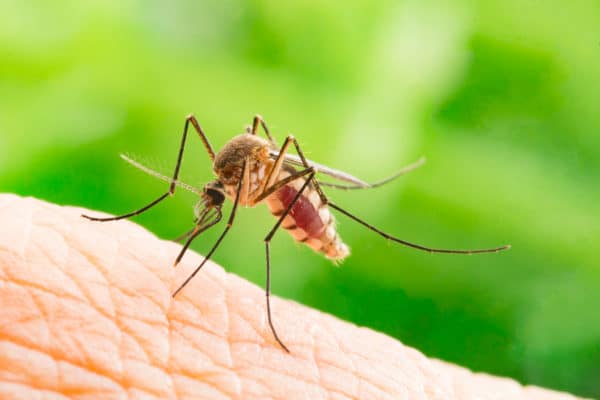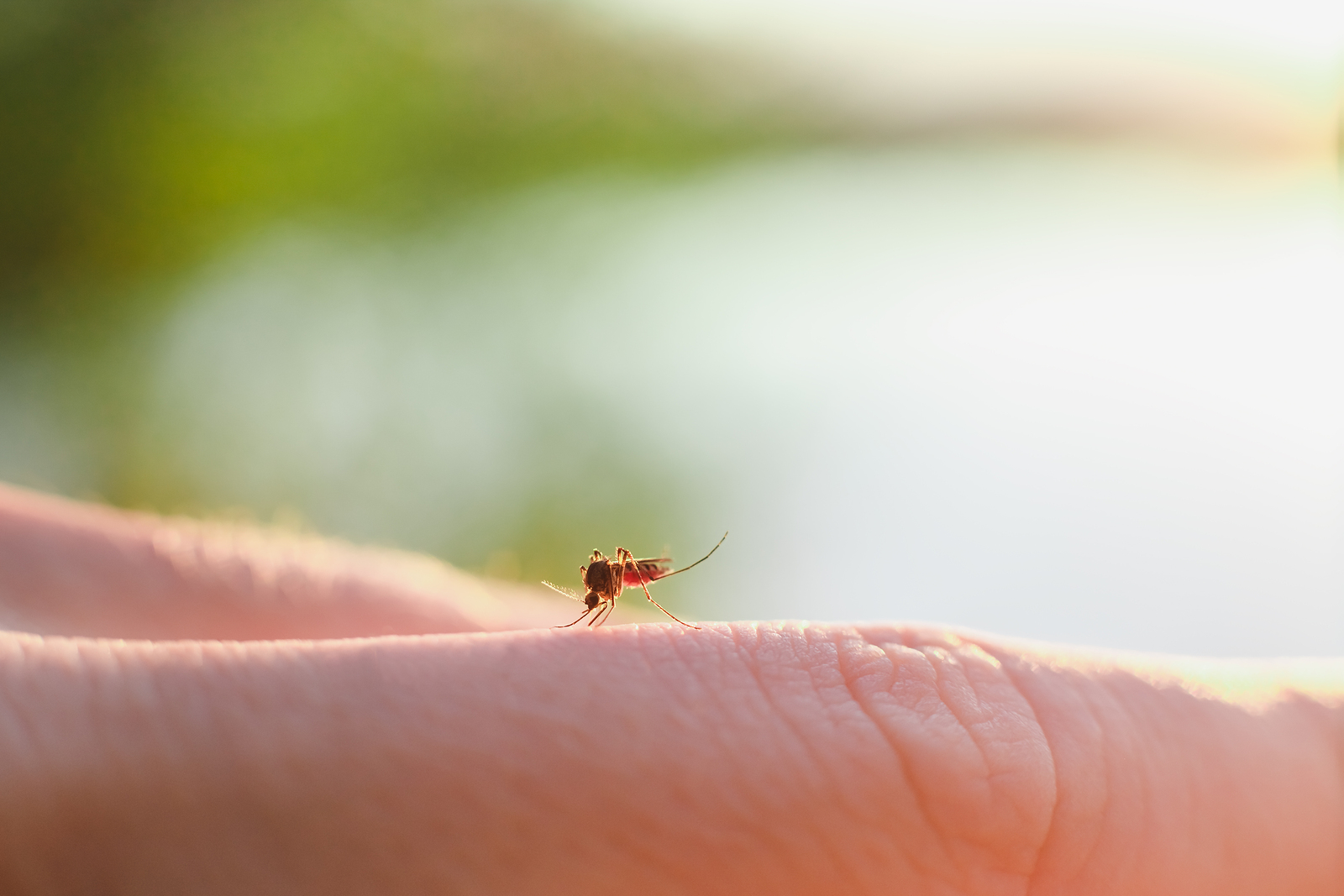READY TO GET STARTED?
REQUEST A FREE ESTIMATE
Fill out the form below or call (888) 466-7849 for a free, no-obligation estimate.

Mosquitoes are one of the most common pests active during the spring and summer months. While most consider them a nuisance with their incessant buzzing and itchy bites, mosquitoes can also be dangerous to both humans and pets, transmitting serious diseases like Zika and West Nile to humans and heartworms and encephalitis to pets. Peak season for mosquitoes is from April to October. What methods for mosquito control are out there? How long do they last? Find out the answers to these questions and more below.
Mosquitoes will begin to lay eggs or previously laid eggs will begin to hatch when the temperature outside consistently reaches 50 degrees in the evenings. Peak mosquito season typically runs from April through October.
There are several benefits included in a mosquito treatment. Green mosquito treatments use products derived from flowers and bacteria and are applied only to areas needed, reducing adult mosquito populations as well as mosquito larvae. A typical mosquito treatment program may include a property inspection to identify potential mosquito breeding and resting areas in and around your home and yard; a service guarantee to come back in between scheduled visits if needed at no charge; mosquito source reduction by eliminating areas of standing water such as clogged gutters, containers, bird baths, etc; larvicide mosquito treatments to target those potential breeding sites; and adulticide mosquito treatments to target adult mosquito resting areas like shrubs, ivy, weeds, small trees, shaded areas.
Several factors affect the longevity of a mosquito treatment including weather, environment, application technique and the mosquito population levels around your home. A typical mosquito treatment lasts about 30 days. After this time, the material begins to degrade making your mosquito protection less effective. It is recommended that mosquito treatments should be applied monthly for the duration of mosquito season.
In general, if your property is less than 1 acre the mosquito treatment will be applied to the entire yard. If your property is greater than 1 acre, technicians will usually start with a treatment area of about 1 acre and progress as needed. The treatment will specifically be applied to the perimeter of the yard in areas of foliage, woods, and shaded damp areas. These are the areas where mosquitoes prefer to rest during the day. This creates the largest impact while using the least amount of product.
Mosquito bites are itchy and sometimes painful; they can also be dangerous as they can transmit serious diseases to both humans and animals. There are several steps you can take to prevent mosquito bites. Use insect repellent any time you will be outside. This repellent should include one of the following ingredients: DEET, Picaridin, IR3535, oil of eucalyptus (OLE), para-menthane-diol (PMD), or 2-undecanone. Cover up with long sleeves and pants. Tuck pants into your shoes if possible. Treat boots, pants, socks, and even tents with permethrin. Use air conditioning or window and door screens to keep mosquitoes out of your home. Make sure screens are in good repair with no holes or tears. Cover cribs, strollers, and carriers with mosquito netting. Once a week empty, scrub, turn over, cover, or throw out any items that can hold standing water such as buckets, planters, toys, pools, birdbaths, flower pots, and trashcans.
Mosquito bites are not only painful, they can cause severe reactions if you have a mosquito allergy. There are several things you can do to treat mosquito bites. First and foremost, don’t scratch the bite. Scratching may temporarily relieve the itching but it also continues to irritate and inflame the skin and can lead to infection. Wash the bite with cool water and soap instead. Try calamine lotion or Caladryl on the bites; there are also several new products containing cortisone or other antihistamines such as AfterBite that can help relieve itching. Use a cold compress or ice pack on the bite to help reduce inflammation. Try an oral antihistamine like Benadryl to help with itching. These take longer to work but can also provide longer relief.
Home Remedies To Keep Snakes Away
Keeping Wildlife Out This Spring
Do I Really Need Termite Protection?

Mosquitoes are known carriers of several viruses, transmitting disease and parasites to people and animals that come in contact with them via painful bites. While some of these diseases don’t pose serious health risks, others can be deadly (over one million people die each year from mosquito-borne diseases, according to the AMCA!). Here are 3 common mosquito diseases you should be cautious of this summer:
First discovered in 1947, Zika, a mosquito-borne virus, originated in Uganda, Africa. Shortly after, outbreaks of Zika were detected throughout tropical areas in Africa, Southeast Asia, and the Pacific Islands, according to the CDC. Now, mosquitoes carrying Zika have been identified in many countries, including the U.S.
Primarily transmitted by the Aedes species, infected mosquitoes can spread Zika to humans and animals through bites. These mosquitoes are active during daytime and evening hours. Zika can also be sexually transmitted from one infected partner to another, from pregnant women to unborn babies, and through blood transfusions.
Common symptom of Zika include rash, fever, joint and muscle pain, headache, and/or red eyes and can last for up to a week, but many infected won’t show any symptoms at all. Zika is dangerous specifically for pregnant women as it can cause birth defects, a condition called Microcephaly, in fetuses. This can cause brain and eye defects, hearing deficits, and impair growth.
Because there’s currently no vaccine to treat and/or cure Zika, the best way to protect yourself is by preventing mosquito bites. Keep arms and legs covered in loose, light-colored clothing when outdoors and use insect repellent. Repair or replace missing or damaged window and door screens at home and keep them closed as often as possible. Control mosquito populations around your home by getting rid of adult mosquitoes as well as reducing mosquito reproduction with home mosquito treatments from a licensed pest control company. Most companies offer eco-friendly mosquito treatment options that are family and pet-friendly, if having your yard treated with chemicals is a concern. If pregnant, the CDC advises to avoid traveling to countries with known Zika outbreaks – see the list here – and refrain from unprotected sex.
Check with your doctor to get tested. To minimize symptoms, drink lots of fluids, get plenty of rest, reduce fever or pain with over-the-counter pain medicines (avoid aspirin), and prevent additional mosquito bites. If you’re bitten by a mosquito once infected, you can pass Zika to other mosquitoes, who will then infect someone else – increasing the spread of Zika. If you’re pregnant and suspect you have Zika, contact your physician immediately.
The first occurrences of West Nile in the U.S emerged in New York in 1999 with 62 confirmed cases and 7 human deaths, according to the AMCA. West Nile virus is a mosquito-borne virus carried by many different mosquitoes, one of the most common being the Culex species.
West Nile is most often transferred from birds to mosquitoes, and then from mosquitoes to humans and animals through bites.
Symptoms may develop 3-14 days after bitten. Typically only 20% of people infected with West Nile virus will experience symptoms which include headache, body aches, and fever and usually last a week or less. Rarely, the virus develops into West Nile encephalitis which can cause high fever, neck stiffness, disorientation, coma, muscle weakness, convulsions, paralysis, and sometimes death. This is most common in people over the age of 50.
Like Zika, there is no vaccine for West Nile virus. Prevent the virus by preventing mosquito bites.
See your doctor. A blood test can determine if you’re infected with West Nile virus. If symptoms are severe, hospitalization may be necessary.
Dengue, a mosquito-borne virus, is the leading cause of illness and death in the tropics and subtropics according to the CDC (400 million people infected each year). While it rarely occurs in the U.S., it’s important to be aware of dengue while traveling to popular tourist destinations like Puerto Rico, parts of Central and South America, Southeast Asia, and the Pacific islands. Dengue is carried by the Aedes aegypti and Aedes albopictus mosquito species which are found throughout the world.
Mosquitoes carrying dengue infect humans through bites and infected humans can infect other mosquitoes, when bitten.
Most cases of dengue in the U.S. were acquired through travel abroad. Symptoms include severe headache, high fever, eye pain, joint pain, muscle pain, and rash. Severe cases can cause stomach pain, vomiting, difficulty breathing, and bleeding from gums and/or nose.
Mosquito bite prevention is key when traveling to areas with known dengue outbreaks as there is no vaccine for dengue or medications to treat it. It’s especially critical for people with dengue to avoid mosquito bites so the disease isn’t spread from person to another mosquito.
If symptoms are mild, lots of rest and fluids are recommended. For more severe symptoms, contact your health care provider immediately.